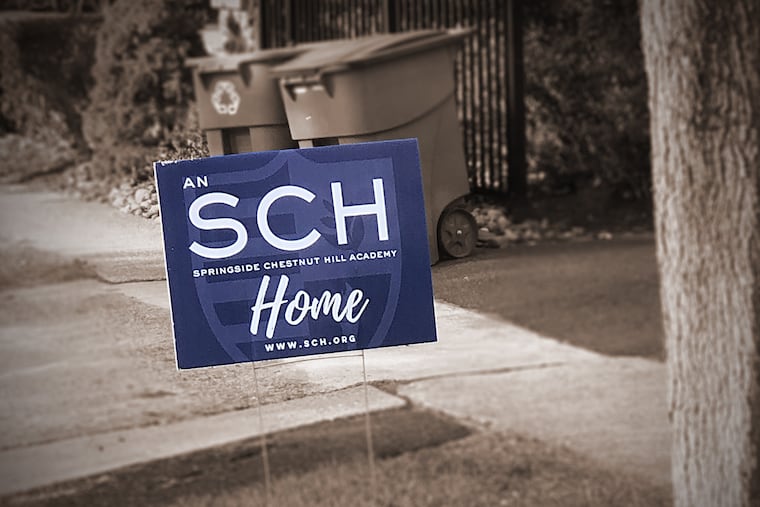Chestnut Hill is fighting over ‘a’ vs ‘an’. Which goes before SCH?
Springside Chestnut Hill Academy, you’ve stirred up a serious grammatical cauldron.

Chestnut Hill is ready to fight.
Dotting the landscape of one of Philadelphia’s toniest zip codes, signs proclaiming scholastic allegiances have cleaved house against house, family against family, blood against blood.
Those signs’ controversial proclamation?
“An SCH Home.”
Springside Chestnut Hill Academy, you’ve stirred up a serious cauldron.
Some are up in arms about the tiny article An that appears on the signs overtop the school’s coat of arms. One local resident, insisting the signs should read “A SCH Home,” sent me a photo of the offending article, along with a note of exasperation at “an educational institution promoting itself without proper grammar.”
On the one hand, this feels like a distinctly first-world controversy — the kind of kerfuffle that could only arise at a private institution whose high school tuition tops $46,000 a year. (For comparison’s sake, Philadelphia’s median household income is $52,649.)
On the other hand, no one knows how to use articles with acronyms or initialisms, so let’s dive in.
The difference between acronyms and initialisms is pedantic, but here, relevant. Acronyms can be read aloud as words on their own: NASA, AWOL, AIDS, FOMO. Initialisms are read letter by letter: FBI, CIA, YMCA. Some will add periods to initialisms (F.B.I.), but most who do that are psychopaths. Or the New York Times.
Often, English speakers will use acronym when referring to an initialism, as acronym is a far more common term nowadays. (Shout-out to every reader who’s sent me a letter complaining when I used the term acronym to refer to an initialism. Yes, there are a lot of you. No, that wasn’t annoying at all.) But acronym’s takeover is surprisingly recent. Initialism is a much older word, dating to the mid-1800s. The word acronym entered the English language only around 1940, making it roughly as old as Chuck Norris.
Then there’s the question of a vs. an. In school — maybe even at Springside Chestnut Hill Academy — you learned that a goes before a consonant and an precedes a vowel. But often that’s not true: If the vowel sounds like a consonant — like one (which sounds like won), or use (which sounds like youse) — it takes an a, while the opposite is true for consonants that sound like vowels (an honor, an hour).
Enter acronyms and initialisms, which screw everything up. There’s no question that abbreviations that start with a vowel sound (like FBI — ”eff bee eye”) would use an (“an FBI probe”).
But what about abbreviations that could be pronounced differently as either acronyms or initialisms, depending on how obnoxious the speaker is? Take LOL: Some (good, law-abiding, attractive) people pronounce it “ell oh ell.” But others — and if you don’t know any of these people, consider yourself lucky — pronounce it “loll,” as in, “That joke was so funny, it provoked a loll.” These are bad people who shouldn’t be speaking. But if they’re going to speak, they might as well use proper grammar so as not to be doubly offensive. That awful joke produced an “ell oh ell,” or a “loll.”
Back in Chestnut Hill, then, the question becomes: How does one pronounce SCH? If it’s “ess see aych,” the signs are correct. If it’s the monosyllabic “skuh,” the signs are wrong and should be A, not An. But I have a feeling everyone at the school opts for the less concise, more euphonious “ess see aych,” which would make the signs correct.
For $46,000, parents can afford a couple of extra syllables.
The Grammarian, otherwise known as Jeffrey Barg, looks at how language, grammar, and punctuation shape our world, and appears biweekly. Send comments, questions, and compounds to jeff@theangrygrammarian.com.